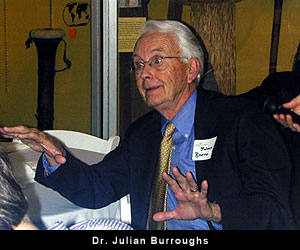
| |
A written and audio history of the campus radio stations at Wake Forest College and Wake Forest University | |
WFDD Alumni Gather for First-Ever ReunionOn October 25, 2003, the first annual reunion of WFDD alumni took place on the Wake Forest campus. The day was a celebration for students who worked at the radio station during its years of student management. Approximately 30 WFDD alumni participated in activities, including a tour of WAKE Radio, a panel discussion at Carswell Hall, and a tribute dinner at the Anthropology Museum.
Leading the panel discussion on broadcasting careers were Paul Ingles ('78), an independent broadcaster, Steve Pendlebury ('77), Deputy Managing Editor, AOL News, John Hasty ('58), an attorney in the broadcasting industry, and Jay Banks ('74), Station Manager for WFDD, who has an extensive newspaper background. Later in the afternoon, the staff of 88.5 WFDD hosted a tour of the studios, now in a freestanding building on campus.
Ceremonies opened with a tribute to Lewis "Tink" Kanoy, the station's Chief Engineer from the 60s to the 80s. WFDD Station Manager Jay Banks ('74) gave Kanoy a plaque stating "Presented to Lewis "Tink" Kanoy in honor of his enduring wisdom, friendship and contributions to WFDD students and staff on the occasion of the first reunion of WFDD alumni. October 25, 2003."
Jack Thomas ('52), Station Manager at the old campus in the town of Wake Forest, began by confessing "I remember one time playing one side of a recording and looking at the other side and thinking: 'That isn't decent. It ought not to be played.' So I took a big nail and scraped it."
Next up was Taylor Sanford ('54) from Arizona. Betty Holliday Bowman ('54) said "I wouldn't take anything for those years - even for the little bitty studio." Anne Beatty Oakman ('57) said, "When I left Wake Forest I thought "I am really a fantastic announcer." So I go back to Rutherford County. I put on my best Sunday clothes and go down to the radio station WBBO and I went into Mr. Anderson who owned the station. I said, Along with Oakman, Tally Roberts ('57) and Vern Pike ('58) worked at WFDD on both the old and new campuses.
"We were FM educational although we did do Deaconlight [a student-programmed music show] late at night," said Bill Stracener ('66). "I started as an announcer, then moved up to Sports Director, then News Director, then Station Manager. When WFDD upped its power from 10 watts to 36,000 watts in 1967, this caused interference with a local TV station. Ken Johnson explained, "I was paid the princely sum of 7 cents a mile to run around town putting twin-lead on TV sets. Our signal along with somebody else's screwed up Channel 8. The other station wanted to shut us down." Kanoy showed him how to wire TV sets to eliminate the herringbone pattern caused by WFDD's signal. "So I ran around with a sheet of names all that summer," said Johnson. "I went into peoples' homes and said 'Hi I'm from Wake Forest. I'm here to fix your TV set.' We put the twin lead on it and Richard Greenberg would turn the transmitter on and I'd snip it and the herringbone would go away."
"We're waiting for the royalties," Donaldson deadpanned. Hosting Deaconlight was a revered position that had to be earned. Steve Oviatt ('73) noted that by the early 70s "Deaconlight was seven nights a week. We were playing what we wanted to play. We were getting flooded with students. You had to work your way up to Deaconlight. You had to be `good enough' to do Deaconlight. We had so many people that wanted to be on the show we started something we called Renaissance in the morning."
But working at WFDD wasn't all about playing rock and roll. Wally Boyd ('74) spoke of the value of working on a weekly radio program called "Sounds of Winston-Salem." "It was like writing a term paper every week." he said. "It prepared me for anything I ever did after I got out of school because you had to think quickly, had to react, had to solve problems, you had to go forward, had to have a plan. It was wonderful training." "Dr. Burroughs kept us a least a little bit in control," said Bill Beery ('73). Michael Miller ('74) found an unusual use for the WFDD studios. He confessed to calling the women's dorm and, using the reverb on the WFDD production board, saying "This is God!!!" with the sounds of thunder in the background. Incidents that at one time were tense made for good laughs that night. One such tale was when a certain MC5 record was played on Renaissance. Keith Young ('74), who was listening, said "One of the words in there was 'shoot.' But Dr. Burroughs heard something else and walked into the control room in the middle of the show. All you heard on the air was 'Sign Off!'"
Hubbard went on to inspire other students, including Steve Pendlebury ('77). "We learned so much more than radio." he said. "I'd look at Jim Dave Sizer ('77) said, "Even today it leaves me in somewhat of awe of thinking of some of the things we did, and some of the things we got away with!" "Working at Wake Forest radio was like a ticket you could go anywhere," stated Steve Marlowe ('77). "You got a chance to meet the most interesting people. Ed McIntyre, who was Music Director in late 70s, was a surprise guest. "When I first started working at WFDD, I was advised by Dr. Burroughs just to turn my radio off after 11:00 because I wouldn't want to listen after that. In the morning there was nothing more to listen to in Winston-Salem so I usually listened to Renaissance. DD Thornton ('81) had a few words regarding the history of the end of Deaconlight. [After Dr. Burroughs left] "The new director decided there were only three types of art in music: classical, folk, and jazz. After the Fall fund drive and Deaconlight had raised a bunch of money, the new station manager said "This show's going to go off the air at the end of the year." So I decided not to fight it because I was graduating that December and I actually was working on some negotiations to take the show to a commercial radio station. So it did sorta continue for awhile, but that's another story. "An interesting thing I found while I was going through some stuff the other day, I found a petition that a bunch of Wake Forest students had gotten together and signed to keep Deaconlight on the air. It's sixty names on a page. When I counted there were 10 pages. So there were 600 Wake Forest students, well 595 Wake Forest students and five Salem girls - who signed this petition to keep it on the air. It didn't but I was really glad I got to do the last two Deaconlights. I also did the last Renaissance." Joel Southern ('82) was the youngest former student to speak. "I was the literal end of the line. The last student station manager. WFDD was at a crossroads in 1981 because [Dr. Burroughs] had decided to focus on teaching. [The new station manager] had some different ideas about how he wanted to run the station. "And that sort of tension led to the decision about Deaconlight. I must admit I had mixed feelings about Deaconlight because I didn't know the music that well. DD helped me out a few times and programmed a few shows. My first program I did was - Bob Marley died - and I had to become an instant expert on reggae and Rastafarianism. But the end of Deaconlight was a very tense time. It was very traumatic for people. DD - despite was she says - was a little angry about it. But there was another side to it to. [The station manager] actually got some threats - whether they were empty threats or not - he had threats like "I'm gonna puncture your tires on your car." So it was a very traumatic thing for everybody. But as I said - the station was at a crossroads, the decision was made, and it is what it is now." Finally it was Dr. Burroughs time to reflect. "I've been sitting here and I am amazed. As I have listened to you tonight I think the advice every teacher ought to have is to 'let them do their thing.' If I had it to do over again," he paused as the crowd laughed in anticipation. "I would do exactly what I did! But I'm here to tell you tonight, just let 'em do their thing. So much of the energy that comes out of a college environment is generated not by the faculty and the administration but by the students interacting and being together.
"I mean, you don't teach that sort of thing. You don't teach students to get on the telephone and call the Red Dog Saloon in Alaska. In fact, you go to bed at 11:00 at night so you don't know! But that's radio. That is priceless radio. And you all have multiplied those incidents over and over." Brian Lewis ('77) summed it up. "This evening has shown me a whole lot of the history of the radio station," he said. "It's so neat to be able to learn all that and meet all the people I didn't know that had worked in the past and to see all the people I worked with. It's just been fabulous. Hopefully we'll see you again before another 30 years is out." |
Wake Forest Radio PeopleTributes |
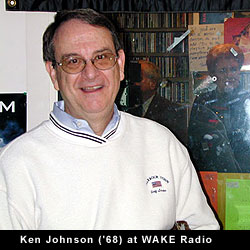 Ken Johnson ('68) led the WAKE Radio tour at the Benson Center. As an attestation of his loyalty to WFDD and his colleagues, Johnson was almost single-handedly responsible for the $50,000 endowment establishing the studios in the memory of his WFDD mates, Richard Greenberg ('68), John Vantrease ('67), and Granger Ancarrow ('66). Johnson also contributed $10,000 to underwrite the Station Manager's office in Greenberg's memory when WFDD moved to its new studios in 1991.
Ken Johnson ('68) led the WAKE Radio tour at the Benson Center. As an attestation of his loyalty to WFDD and his colleagues, Johnson was almost single-handedly responsible for the $50,000 endowment establishing the studios in the memory of his WFDD mates, Richard Greenberg ('68), John Vantrease ('67), and Granger Ancarrow ('66). Johnson also contributed $10,000 to underwrite the Station Manager's office in Greenberg's memory when WFDD moved to its new studios in 1991. 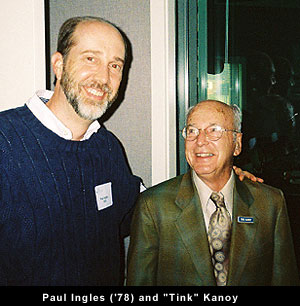 Among the dinner guests were 24 former WFDD students, including Dr. Julian C. Burroughs, who also spent more than two decades as WFDD's Faulty Advisor. They came from as far away as Arizona, Charleston, Washington, and New Mexico. They graduated as early as 1951 and late as 1982.
Among the dinner guests were 24 former WFDD students, including Dr. Julian C. Burroughs, who also spent more than two decades as WFDD's Faulty Advisor. They came from as far away as Arizona, Charleston, Washington, and New Mexico. They graduated as early as 1951 and late as 1982.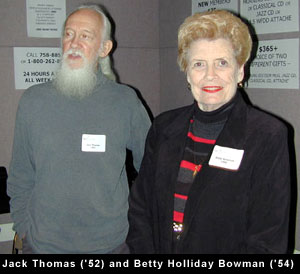 Paul Ingles took over as host, strolling through the room to locate each former WFDD student to share experiences. It was apparent everyone felt they had worked in the "Golden Age" of WFDD.
Paul Ingles took over as host, strolling through the room to locate each former WFDD student to share experiences. It was apparent everyone felt they had worked in the "Golden Age" of WFDD.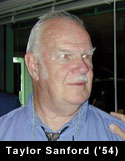 "I did that all the time!" joked Burroughs from his table to much laughter from his former students.
"I did that all the time!" joked Burroughs from his table to much laughter from his former students. 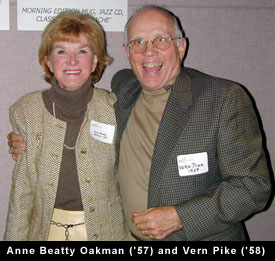 'Mr. Anderson, I want a job at your station.' `You want a secretary job?' 'No sir, I want to be an announcer!' And he looked at me and said 'Anne, you are 20 years ahead of your time.'"
'Mr. Anderson, I want a job at your station.' `You want a secretary job?' 'No sir, I want to be an announcer!' And he looked at me and said 'Anne, you are 20 years ahead of your time.'" The next group of alumni were all former students of Burroughs, whose insistence on professionalism made its mark.
The next group of alumni were all former students of Burroughs, whose insistence on professionalism made its mark.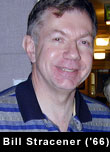 I learned a lot. I learned how to say DOUBLE U!"
I learned a lot. I learned how to say DOUBLE U!"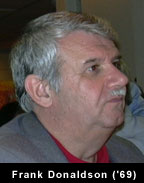 Frank Donaldson ('69) suspects Deaconlight's creativity was purloined by a savvy TV network. "Somebody from up North must have been listening to the radio station." he said. "The Sunday Night Deaconlight was some crazy people. We would go in about 6:00 Sunday night to work on a show that would start at 11:00. The show started with a skit that culminated in 'It's the Sunday Night Deaconlight.' At midnight we did fake news. In 1975 a TV show goes on the air that starts out with a skit ending in `Live from NY, It's Saturday Night' that at midnight did fake news.
Frank Donaldson ('69) suspects Deaconlight's creativity was purloined by a savvy TV network. "Somebody from up North must have been listening to the radio station." he said. "The Sunday Night Deaconlight was some crazy people. We would go in about 6:00 Sunday night to work on a show that would start at 11:00. The show started with a skit that culminated in 'It's the Sunday Night Deaconlight.' At midnight we did fake news. In 1975 a TV show goes on the air that starts out with a skit ending in `Live from NY, It's Saturday Night' that at midnight did fake news. 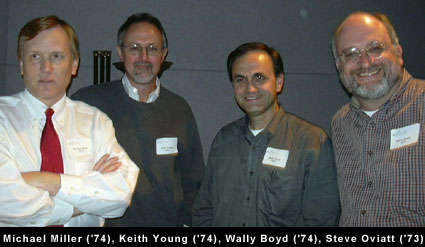
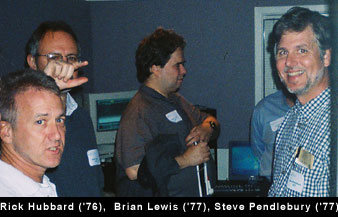 Rick Hubbard ('76), known then as Fred, told how Beery said he should work at the station. "And I said, let me get this right, I get a 36,000 watt FM stereo radio station and I can do anything I want after 11:00?"
Rick Hubbard ('76), known then as Fred, told how Beery said he should work at the station. "And I said, let me get this right, I get a 36,000 watt FM stereo radio station and I can do anything I want after 11:00?" [Brawley - Student Station Manager] and wondered how is this guy keeping this group of people marching in the same direction? Things that Dr. Burroughs and all the rest along the way have helped us to achieve - I owe them a big debt."
[Brawley - Student Station Manager] and wondered how is this guy keeping this group of people marching in the same direction? Things that Dr. Burroughs and all the rest along the way have helped us to achieve - I owe them a big debt."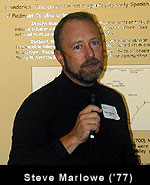 WFDD was the entrée to so many things."
WFDD was the entrée to so many things."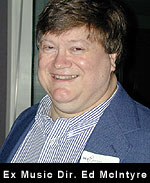 One morning the people at Wake Forest were remodeling the snack bar, which was right below the studios. And the guys would start working at about six in the morning there'd be saws going and of course when Paul was on that morning he turned on his microphone there'd be all this noise and finally he got very frustrated and just went bang bang bang stomping his foot and said, "Hey quiet down there! We're trying to do radio up here."
One morning the people at Wake Forest were remodeling the snack bar, which was right below the studios. And the guys would start working at about six in the morning there'd be saws going and of course when Paul was on that morning he turned on his microphone there'd be all this noise and finally he got very frustrated and just went bang bang bang stomping his foot and said, "Hey quiet down there! We're trying to do radio up here." That created some tensions such as the time - we talked a little bit earlier about having to run the Sunday morning Sermon [from Wait Chapel] - well we also had to run every year the commencement ceremonies. [The new station manager] didn't want to run them one year and didn't tell anybody about it - at least didn't tell Dr. Scales and didn't tell other people. But the ladies at the information desk kept calling up that morning: 'When are you going to air the commencement ceremonies?' And we said, 'Well, we're not.' About an hour and 15 minutes later before the time to start there's a call from Dr. Scales to [the station manager], 'You are going to put the commencement ceremonies on the air!' Scott Davis and I got every last microphone cord we could find. We plugged it into the console - I think the production console - we ran it down the hall out over one of the magnolia trees down the quad - I mean this was about 100 yards of microphone cord. This was just microphone cord. It had no amplifiers or anything like that and it had that 'zszszszsz' sound but we had the commencement ceremony.
That created some tensions such as the time - we talked a little bit earlier about having to run the Sunday morning Sermon [from Wait Chapel] - well we also had to run every year the commencement ceremonies. [The new station manager] didn't want to run them one year and didn't tell anybody about it - at least didn't tell Dr. Scales and didn't tell other people. But the ladies at the information desk kept calling up that morning: 'When are you going to air the commencement ceremonies?' And we said, 'Well, we're not.' About an hour and 15 minutes later before the time to start there's a call from Dr. Scales to [the station manager], 'You are going to put the commencement ceremonies on the air!' Scott Davis and I got every last microphone cord we could find. We plugged it into the console - I think the production console - we ran it down the hall out over one of the magnolia trees down the quad - I mean this was about 100 yards of microphone cord. This was just microphone cord. It had no amplifiers or anything like that and it had that 'zszszszsz' sound but we had the commencement ceremony.